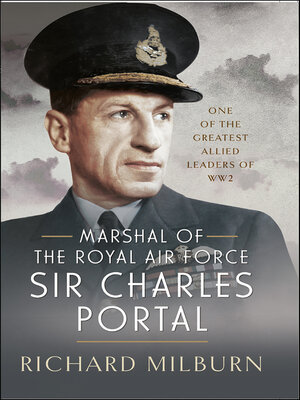Marshal of the Royal Air Force Sir Charles Portal
ebook ∣ One of the Greatest Allied Leaders of WW2
By Richard Michael Milburn

Sign up to save your library
With an OverDrive account, you can save your favorite libraries for at-a-glance information about availability. Find out more about OverDrive accounts.
Find this title in Libby, the library reading app by OverDrive.



Search for a digital library with this title
Title found at these libraries:
| Library Name | Distance |
|---|---|
| Loading... |
Charles Frederick Algernon Portal was born in Hungerford, England, in 1893. One of seven brothers, Portal developed a fierce competitive streak and a steely determination from an early age. Known by all who knew him as ‘Peter’, Portal enlisted in the Army at the outbreak of the First World War as a dispatch rider, being mentioned in General French’s very first dispatch.
Portal’s abilities were quickly recognized, and he gained a commission in short order. It was in the air that Portal saw his future, and he subsequently transferred to the Royal Flying Corps, initially as an observer, before training as a pilot. In this latter role, Portal proved a courageous and instinctive leader, garnering the rare accolade of a DSO and Bar for his wartime service.
His meteoric rise continued in the inter-war period, and when Hitler’s forces invaded Poland, Portal had already ascended to the Air Force Board. He then took the RAF’s top command post at Bomber Command during the battles of France and Britain, before replacing Cyril Newall as Chief of Air Staff, aged just 47, in October 1940.
Charles Portal was, in General Eisenhower’s words, ‘Britain’s greatest wartime leader, including Churchill’. Portal was a strategist, a diplomat and an outstanding leader of the RAF in the Second World War. He built productive and enduring relationships with the most powerful Allied leaders – some of which, including Churchill, Bomber Harris, and Hap Arnold, are explored here. Portal helped direct the UK’s strategy from the darkest days of 1940 through to Allied victory in 1945. He never lost his calm, even under the most extreme pressure, and approached the war with a cool logic that defied the chaos of the day.
Despite his enormous achievements, and being showered with post-war accolades, Portal is little known today. His historical anonymity is a reflection of his disinterest in his own legacy. He neither kept wartime diaries, nor penned an egotistical autobiography to cash in on his post-war fame. He retired as he had served, with dignity and humility, traits that made him particularly influential with American allies.
As Wing Commander Rich Milburn reveals in this long-overdue second biography, Charles Portal was a hero in every sense; a heroic battlefield leader in one global conflict, and one of the men most directly responsible for Allied victory in a second.
Portal’s abilities were quickly recognized, and he gained a commission in short order. It was in the air that Portal saw his future, and he subsequently transferred to the Royal Flying Corps, initially as an observer, before training as a pilot. In this latter role, Portal proved a courageous and instinctive leader, garnering the rare accolade of a DSO and Bar for his wartime service.
His meteoric rise continued in the inter-war period, and when Hitler’s forces invaded Poland, Portal had already ascended to the Air Force Board. He then took the RAF’s top command post at Bomber Command during the battles of France and Britain, before replacing Cyril Newall as Chief of Air Staff, aged just 47, in October 1940.
Charles Portal was, in General Eisenhower’s words, ‘Britain’s greatest wartime leader, including Churchill’. Portal was a strategist, a diplomat and an outstanding leader of the RAF in the Second World War. He built productive and enduring relationships with the most powerful Allied leaders – some of which, including Churchill, Bomber Harris, and Hap Arnold, are explored here. Portal helped direct the UK’s strategy from the darkest days of 1940 through to Allied victory in 1945. He never lost his calm, even under the most extreme pressure, and approached the war with a cool logic that defied the chaos of the day.
Despite his enormous achievements, and being showered with post-war accolades, Portal is little known today. His historical anonymity is a reflection of his disinterest in his own legacy. He neither kept wartime diaries, nor penned an egotistical autobiography to cash in on his post-war fame. He retired as he had served, with dignity and humility, traits that made him particularly influential with American allies.
As Wing Commander Rich Milburn reveals in this long-overdue second biography, Charles Portal was a hero in every sense; a heroic battlefield leader in one global conflict, and one of the men most directly responsible for Allied victory in a second.







